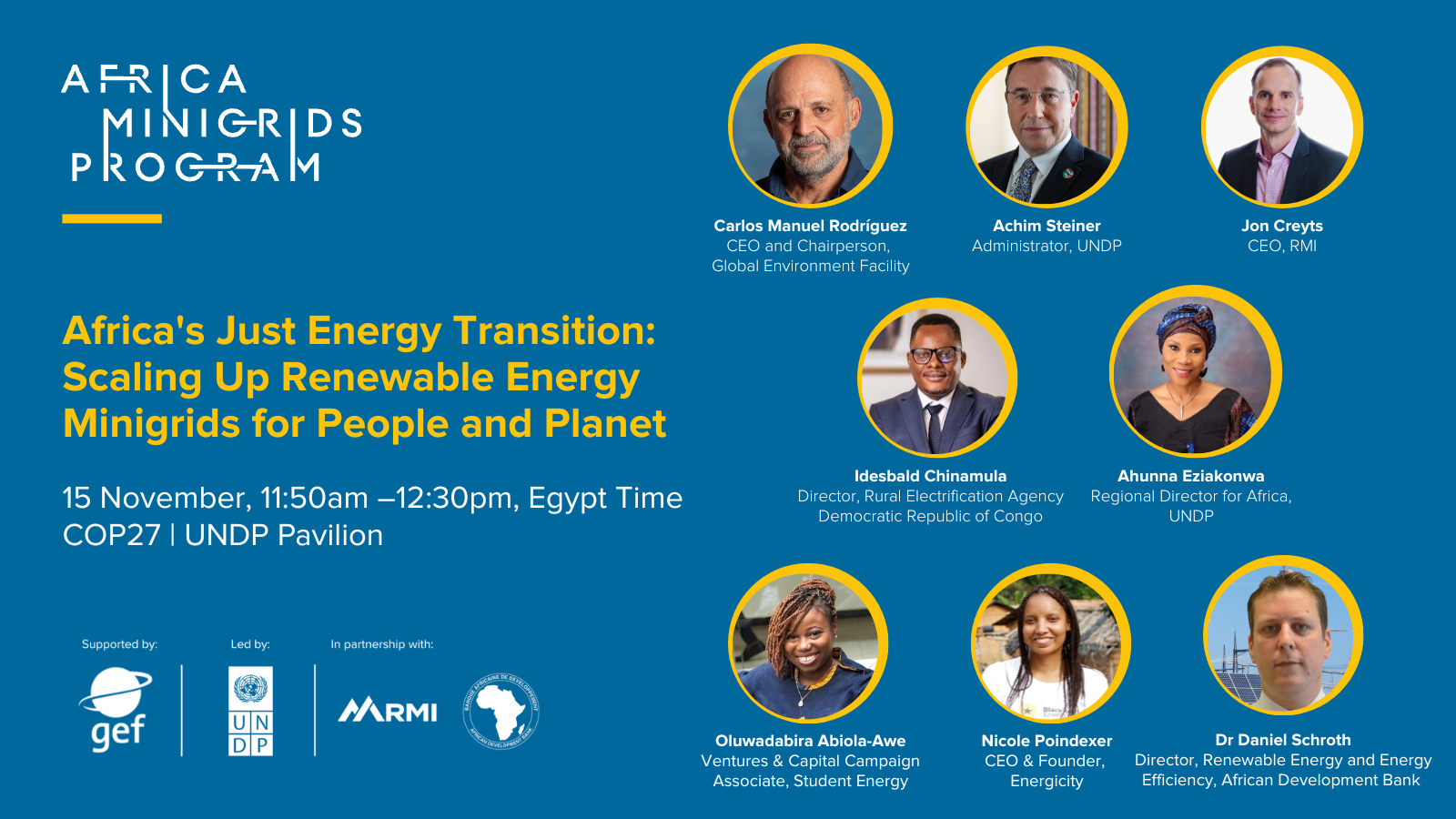The Africa Minigrids Program, a multi-partner initiative led by the United Nations Development Programme (UNDP), will enable scaled-up private investment in renewable energy minigrids
UNDP launches the Africa Minigrids Program during the Africa Renewable Energy Forum at COP 27
November 15, 2022

Sharm El Sheikh, 14 November 2022 – The UNDP Regional Bureau for Africa in partnership with the African Influencers for Development (AI4Dev) – UNDP Africa’s private sector partnership platform, and the Africa Business Council (ABC), convened the inaugural Africa Renewable Energy Forum (AREF) at COP27 in Sharm El Sheikh, Egypt – under the theme “Powering Development”. The gathering, hosted at the Climate Action Innovation Zone by the Africa Finance Corporation, brought together captains of industry, private sector leaders, and senior officials of the United Nations and of the African Union to define actions and strategies needed to set the continent on a sustainable energy pathway.
With Africa's population forecast to grow to 2 billion people by 2050, two out of every five children in the world will be born on the continent. The future of these young people will depend greatly on getting the transition to greener, cleaner, abundant and sustainable energy right. Access to energy is a pre-condition to development and will power Africa’s industrialization while also creating the jobs of the future and reducing vulnerability to external shocks.
“Africa is a critical actor in regard to Climate Action and we now have the opportunity to power green development on the continent,” emphasized Ahunna Eziakonwa, UN Assistant Secretary-General and Director of the UNDP Regional Bureau for Africa. “We must scale up our initiatives, secure a just energy transition and sustainable finance that will allow Africa to mitigate and adapt to the impacts of climate change while accelerating its development ambition.”
Representing the African Union Commission-led Africa Business Council, co-convener of AREF, Ambassador Albert Muchanga, AU Commissioner for Economic Development, Trade, Tourism, Industry & Minerals urged public and private actors to take a ‘bottom-up’ approach to powering Africa. He said: “Majority of Africans still do not have access to electricity; and this is a major concern. If we are to power development, we must not leave anybody behind. The speed of our development will not be determined by the people at the top of the development process, but by the people at the bottom.”
As Africa currently faces unprecedented economic shocks sparked by the COVID-19 pandemic and the war in Ukraine, participants stressed the importance of mobilizing resources on the continent to support Africa’s industrial capacity development. ““The crisis we are facing now is about resources and Africa is instrumental to the solution. We cannot continue to export raw materials. We must focus on exporting value added products for the structural transformation of our economies,” argued Samaila Zubairu – President of the Africa Finance Corporation and host of the event.
The importance of transforming Africa’s development model and focusing on industrialization and the AfCFTA was emphasized by Carlos Lopes, Professor at the University of Cape Town, and former Executive Secretary of the UN Economic Commission for Africa. He also urged countries to free themselves from what he called ‘the colonial trap’, which saw colonial-era African economies primarily structured for extraction and the export of commodities. “The growth trajectory the world has used to develop has not benefitted developing countries where resources are found. The structure of Africa’s trade today shows that Africa is highly dependent,” said Carlos Lopes, who added that carbon markets now present new opportunities for Africa’s trade and development.
Ms. Damilola Ogunbiyi, CEO and Special Representative of the UN Secretary-General for Sustainable Energy for All, “The African continent holds tremendous potential for renewable energy projects. The region has demonstrated a firm commitment to accelerating the use of modern renewable technologies. However, global support for the continent must recognize that our clean energy future depends on uniting our current efforts on energy, climate and development”.
Amadou Hott, Senegal’s former Minister of Economy, Planning and International Cooperation, cautioned that Africa must use the opportunity of the energy transition to industrialize. He said “We should not fall in the trap of using Africa’s renewable energy for export only. Industries must also be developed on African soil.”
Sub-Saharan Africa is the region with the highest energy access deficit in the world. An estimated 568 million people do not have access to electricity in sub-Saharan Africa. This represents three-quarters of the world’s population without electricity.
On the criticality of access, Ahunna Eziakonwa highlighted UNDP’s commitment to ensure that 500 million people – worldwide – get access to renewable- based electricity. This programme to be rolled out under the Africa Minigrids Programme, which will be launched at COP 27 on 15 November, “will play an important role in improving livelihoods and tackling poverty”, said Ahunna Eziakonwa.
Some 80% of people in sub-Saharan Africa don’t have access to clean, safe fuels and technologies for cooking, which constitutes 40% of the world’s population that does not have access to clean cooking. This substantial energy gap effectively locks some of the world’s most vulnerable communities in poverty, with most of them living in Africa.
For more information, please contact:
Eve Sabbagh, Strategic Communications Specialist, UNDP, eve.sabbagh@undp.org, +1 484 904 5730

 Locations
Locations



